#my masterpiece is done i have peaked i'm retiring now
Explore tagged Tumblr posts
Text
Hey hello I made a thing! As perhaps a few of you know, I have spent the last half a year being completely unhinged about Patrick O’Brian’s Aubrey-Maturin books, and I’ve always been particularly interested in the character Stephen Maturin and his relationship to Catalonia. I saw that there was a lack of stuff about this part of his identity, and, being me, I felt the need to fill it in the only way I could: compiling music and yelling about it for thirty pages. Hence this playlist.
You really don’t need to know anything about these books to listen to this playlist. You also don’t need to know anything about Catalan (I hope). Catalonia and the Catalan Countries in general (including Valencia, the Balearic Islands, and parts of southern France, Aragon, and Sardinia) have a really interesting musical and literary tradition, and I wanted to make that more accessible, so I put together a few songs I liked, translated them, and wrote a bit about each of their significance, including the most important cultural tidbits I could. Some things don’t translate super well, and I hope my Catalan followers will forgive me for trying to adapt them more for English-speaking audiences than perhaps would be preferable; I usually don’t choose to do that, but in this case I wanted to open the door, and not to intimidate people.
Now that that’s out of the way, here is a link to the PDF of the liner notes (graphic design is my passion, as they say): https://drive.google.com/file/d/1MUpRM84W8aypznEIrt0eA1jG5OxaRZvz/view?usp=sharing
Under the cut I’ve included the ephimera and unnecessary commentary that you know and love, feel free to read or ignore it as you will
These roughly follow the order of the songs and are varying levels of seriousness
If you like "Sant Joan, feu-lo ben gran" then I'd highly recommend listening to the whole Tornaveus album. I almost included the “Stabat Mater de Sudanell” and the “Goigs de Sant Julià de Lòria”, which are both from western Catalonia, and they also have more cançons de pandero, in perhaps a slightly more traditional style. A lot of the other songs have interesting cultural commentary in them, especially on feminist topics, and they’re very well-researched because literally one of the members of the group is basically the ethnomusicologist of Catalan music at the moment. Anyways, if people would like the liner notes perhaps next time I’m home I’ll scan them, they’re in Catalan and English and very well-written. Also note the legendary Lluís Llach song which has been turned into a polyphonic piece lol (and I did not include the “Goigs de la Nostra Senyora de la Llibertat” but tbh that might have been a mistake on my part) (Blorbo side note that I think this fits Stephen’s childhood very well which is mostly why I chose it)
“L’Hereu Riera” is one of my favorite Catalan folk songs I love it so much and if you want to hear the Catalan version (as opposed to the Valencian one included here) and see the dance and also see a cobla, I am including a link to this version by Germà Negre which is tragically not on Spotify. I chose the Valencian one because (1) Al Tall and (2) I think it fits The Blorbo better (specifically I was thinking of his fiancée who dies before Book One who idk if anyone ever remembers shdjfhskf). That being said, Stephen would probably know the Catalan one (and almost certainly not the Valencian one). Also, on a memey-er note, Hereu Riera bisexual king and literal icon <3 love how he has to remind his girlfriend on her deathbed that actually he'd technically be interested in both her sisters AND her brothers if he wasn't so into her that he never wanted to marry anyone else
I literally did put in Roger Mas just so there would be at least one person with a Lleidan accent, #diversity win
Many points about the “Cançó de pandero de l’Urgell” and “Jo no canto per la veu” so here we go:
I put these two songs in mostly because I got very obsessed with the cançó de pandero from Alcarràs (which is a great movie that came out last year about a farming family in a village near Lleida that is winning all the awards atm). Anyways, since Carla Simón has been too busy winning things to put up the gotdam soundtrack, I did a bit of digging and it turns out that it was written for the movie?? By her brother??? It's excellent and very anticapitalist and you can listen to it here and see the trailer for Alcarràs all in one! (Includes English subtitles)
The original “Canto per un amic meu que per mi daria la vida” is probably from a Valencian cant de batre, although I could not get any confirmation on that. But regardless everyone should listen to Pep Botifarra's version of it, which I would literally marry if it had a physical form it’s so so good. (I posted it here back in ye olden days but it's been long enough I think I can post it again)
Valencian music side note because I can’t stop myself: the second pair of verses in the "Cançó de pandero de l'Urgell" (starting with “vos esteu ben acotxada…”) are sung by Miquel Gil, who is a very famous Valencian traditional singer, anyways you should listen to this version of him singing “Del Sud” by Obrint Pas (you want to go down a Valencian music rabbit hole so so bad)
I firmly believe that Stephen would canonically be obsessed with Ausiàs March, and the fact that he has not yet recited any of his poems is Patrick O’Brian’s biggest failing in my eyes. Anyways I have more thoughts but I’m saving them for other posts shdfjsd
If you read this before listening to the playlist please just listen to "El testament d'Amèlia" and follow along with the lyrics in real time before reading the blurb, it's such a good experience to let that song hit you as it comes. I won't say more than that but you'll get it when you get it. (Also obligatory listen to Marala they're so good <3)
From the Càntut album, I also quite like the songs "El pomeró" and "El divino vull cantar", and Càntut in general is an incredible resource, it's a database of folk song field recordings from northeastern Catalonia.
Brief pause to scream about the fact that Maria Arnal and Marcel Bagés WERE ON NPR??? AND NO ONE TOLD ME???? Anyways link in the sources section, also they're great and you should listen to their whole discography
As the #1 Roba Estesa stan blog on Tumblr, listen to Roba Estesa. And Ebri Knight. And El Diluvi.
I chose this version of "La presó de Lleida" because I like it but here's a more traditional one sung by Joan Manel Serrat, another Catalan legend. Here's another one in Catalan rumba style with Sílvia Pérez Cruz singing, the sound is a bit wonky but it's also one of my favorites. The Valencian version of this song is called "La presó de Tibi" and El Diluvi have done a very explicitly anti-monarchical rendition of it (the Balearic one is "La presó de Nàpols").
I'm sorry for never putting the Sílvia Pérez Cruz version of "Corrandes d'exili" but if you want it here it is. Also note that the statue of the Virgin in the poem is a reference to the Virgin of Montserrat, it literally all goes back to her shfjkshdf (also apologies for being very bad at Christianity and Catholicism, if I mistranslated things let me know)
HOO BOY SARDANA TIME
Okay so I have a whole essay to deliver on this that I've been holding inside for the past like two months or so, I apologize in advance for my excessive pedantry on the topic.
In Master and Commander, Stephen delivers this speech:
"‘Then I must tell you that on Sunday mornings it is the custom, in that country, for people of all ages and conditions to dance, on coming out of church: so I was dancing with Ramon Mateu i Cadafalch in the square before the cathedral church of Tarragona, where I had gone to hear the Palestrina Missa Brevis. The dance is a particular dance, a round called the sardana.’"
I hate to be a hater but it is very, very unlikely that anyone would have been dancing a sardana as far south as Tarragona in this time period. The sardana as the symbol of equality and brotherhood emerged in the Renaixença and would not yet have been a thing; Stephen could well have heard sardanas in Ullastret, but they would have been a more typical folk dance, and not anything like the way they're described in the book. It's very ironic, then, that they've become THE Catalan music style for Aubreyad readers, but hopefully this playlist can change that a bit :)
(also sorry for being a sardana-hater on main, someone bring me to dance a sardana and maybe I'll feel better)
Songs that didn't make the cut: La cançó del lladre, Rossinyol que vas a França, La balanguera, La gavina - I'm always happy for more recs!
Originally, this list was also going to include songs in Irish; I quickly realized that I was in over my head with that one, but the working list of songs is here (may be subject to changes so save songs elsewhere if you like them!). Also I would add "Fé Bhláth" by Imelda May and Kíla if it was on Spotify but alas it is not; and "Amhrán na Leabhar" which I have not had time to add but was kindly recommended by someone. I'd love it if someone was interested in actually doing a proper playlist for Irish though—it's a gap in my knowledge that I'd love to start filling.
Aaaaaaand that's a wrap. I hope. Final comment to say thank you to everyone who voted in the cover image poll, turns out you all won :) (Pirineus did win and take the cover of the liner notes though)
#my masterpiece is done i have peaked i'm retiring now#jkjk but i've been working on this since like. november#so it is kind of insane that's it's finally done#please notify me of any mistakes or corrections <3#and hopefully this is enjoyable for you all!#it's a little funky at times but i think it works???#it's not really a playlist. it's more like one of those weird compilation albums that i definitely didn't consume too many of as a child#did kind of want this to show up in the aubreyad tag but i wanted links more so rip :// anyways here goes nothing#aubreyad#catalan#catalan:general#catalan:music#catalan:reference#catalan:culture#general:music#general:reference#general:culture#there'd better not be any typos or i'm fighting someone
91 notes
·
View notes
Text
the day isym said: i'm gonna fuck shit y'all up
So this is how it ends. I guess I won't be able to let this go sooner, or not ever.
Following the lives of these incredible characters since 2014 had been an astonishing journey for me. And now, we reached the end of one of the most-loved mangas, Attack on Titan/Shingeki No Kyojin—probably the only masterpiece that will touch my heart like this in this lifetime.
What an awful timing it was that chapter 139 arrived at the time I was supposed to be celebrating with my mutuals on exoltwt lol. While, overall, I rate AoT as 11 out of 10, I can't eschew that the culmination has left me qualms and questions unresolved.
Let's start with Armin thanking Eren for his sacrifices for Paradis—which equates to thanking him for committing a global genocide (bro, wtf???). This did not sit right with me, but I'm taking into account that Armin could see there was no easy way out, and that he believes achieving peace requires sacrifices, notwithstanding his altruistic nature and efforts to not completely throw away his humanity.
And I'm also considering the fact that, with the reality Paradis had, bringing off peace without lives being taken was a wishful thinking.
His idealistic worldview clashed with Eren's, and he wasn't able to present a solid resolution 'til the windup. And yet, Armin was still willing to talk things out with his best friend so they could come up with a better plan, without further casualties.
Up until the very end, he wanted PEACE.

I think, this is what makes Armin admirable, contrary to what other readers paint him out to be—weak and useless. He's one of the strongest and skilled characters in AoT imo. He didn't need to be a Titan or an Ackerman. He's innately whip-smart and a natural tactician, making himself a consequential character despite his lacking combat skills.
Weighing up Armin's burdens and the mental load he carries, it hurts to be in his shoes, especially since he's the commander. He's torn between his friend's life and the rest of the world. He took the responsibility of the Rumbling aftermath to shoulder Mikasa's burden and let her live in peace.
And in the end, conflict dragged on, and he ended up with a large obligation to the people.
There were little appearances of Historia, which I initially found a bit absurd since she's among the important characters in the whole series. She didn't say anything, and her pregnancy was for what again? I was disappointed. Her bearing a child held no importance and was a random subplot.
Conversely, amid a slew of readers demanding her clarification on knowing Eren's plans from the get-go, her explanation on the matter would be unnecessary. It seemed to me she has done her part on how the story would play out. And if there was an epilogue or a succeeding set of panels, Historia might've made her comeback since her role as the queen is expected to hugely partake in peace propositions.
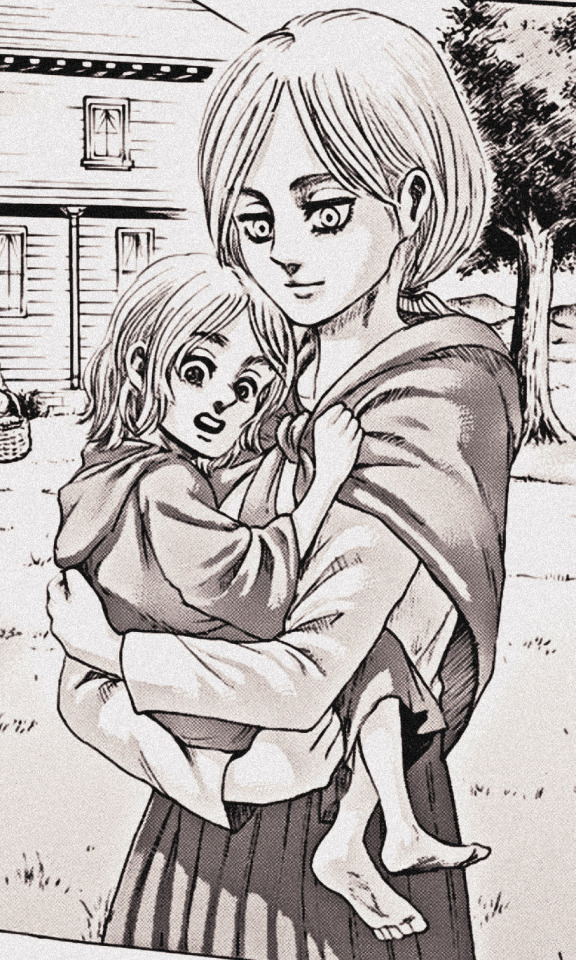
And over and above these, the final chapter seemed...rushed? I feel like some panels need to be fleshed out more, such as the whole of Founder Ymir's feelings towards that bitchass abuser Karl Fritz. I was appalled that the root of the sufferings that prolonged for two millennia was because of her martyrdom and servitude to the king and the royal family, which she described as love.
But in reality, without having to chew this over, Ymir didn't really know what true love is. She was a slave since birth, her family was massacred by Karl Fritz, and was impregnated thrice by this murderer who never gave a shit about her. She lived a wretched life, manipulated and abused, and died after jumping in front of the spear to protect the king.
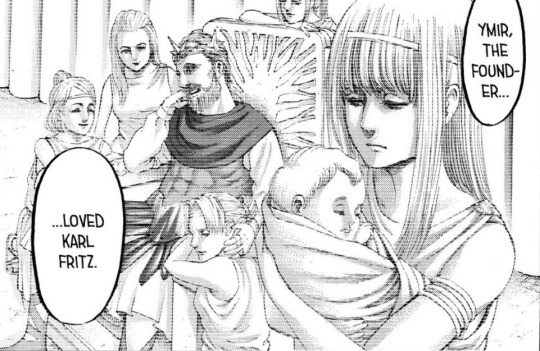
Brought by fear of losing the power of the titan, he made her daughters eat Ymir's flesh and told then to bear many children. Sick fuck.
Then Ymir discovered Mikasa, who she deemed a mirror of her own. The difference, however, is that Mikasa's love for Eren isn't one-sided. And so her greatest desire to be freed from an abusive relationship was accomplished after discovering what real love is through EreMika.
Speaking of Eren, I can understand why plenty of readers condemned him. The guy, who masked himself as a peak tsundere, cold, temperamental bastard, exterminated almost the entire global population, and when asked by Armin his reason, he said he didn't know why, so from here we can assume he neither had a goal behind that warped undertaking nor did it for the greater good.
But Armin is smart, and Eren's silence was a tacit answer. The predicament seemed unsolvable, and wiping 80% of humanity is his last resort to hold off the rest of the world from attacking Paradis.
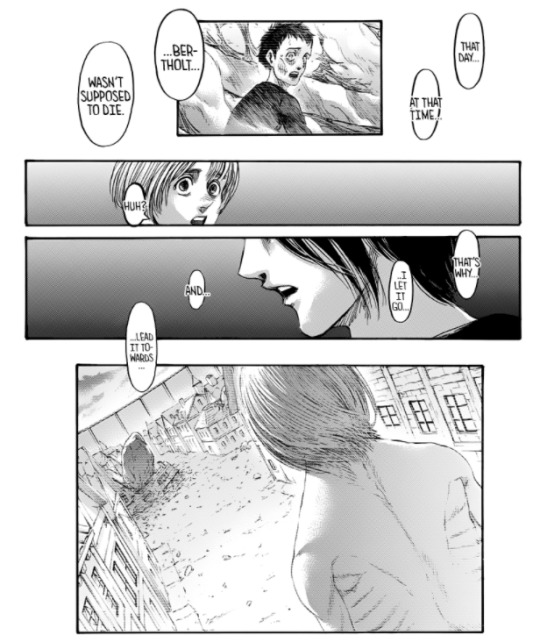
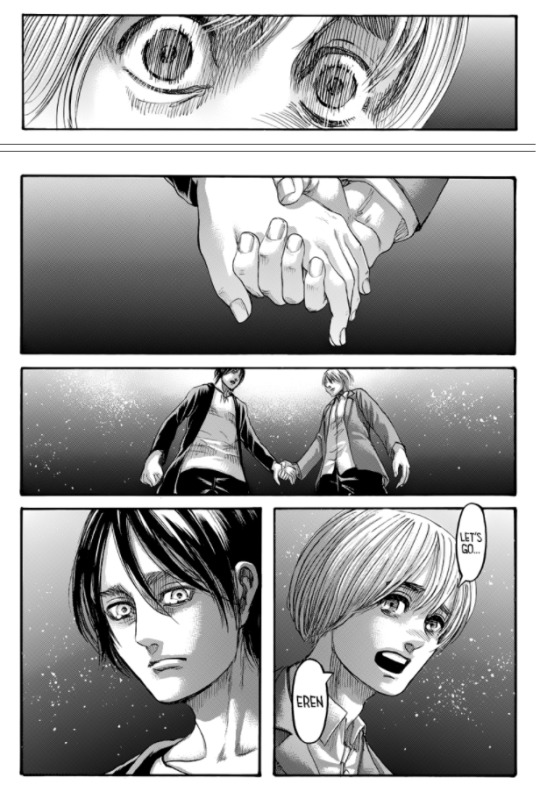
Taking also into account that he didn't mean to have his mother killed by Dina after rerouting her from Bertholdt. If he didn't, Bertholdt wouldn't end up as the Colossal Titan and Armin wouldn't have eaten him and died along the way.
Bear in mind that Eren believed Armin would save the world, but if he kicked the bucket—and had Eren, who was obviously enslaved by his destiny, altered anything in his memories—would unravel another reality unknown to Eren that could pose a bigger risk.
And the fact that he let the familiar fate dictate him meant opening a door to another door of possibilities of achieving world peace, with Armin taking the lead.
By making himself the bad guy in his story to make his friends be the heroes, the ending suggests that harmony would work out in the end.
In 139, Armin, Reiner, Pieck, Annie, Jean, and Connie were planning to make peace negotiations. And through this, there's a light at the end of the tunnel.
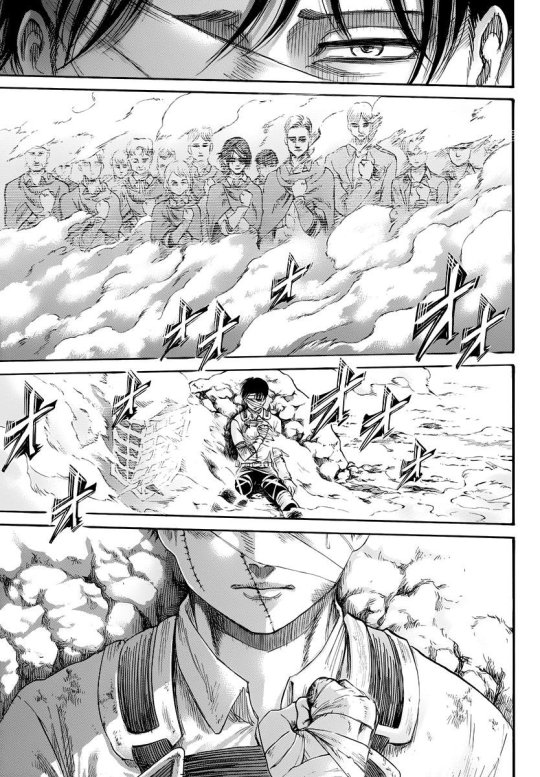
Levi finally bidding farewell to his comrades bawled my eyes out—this is probably the saddest shit ever AoT has ever done to me, next to Erwin's death. Levi is the last one existing among his original comrades, and it sent a pang to my heart when he did his final salute, wearing a faint smile while wrapped in bandages.
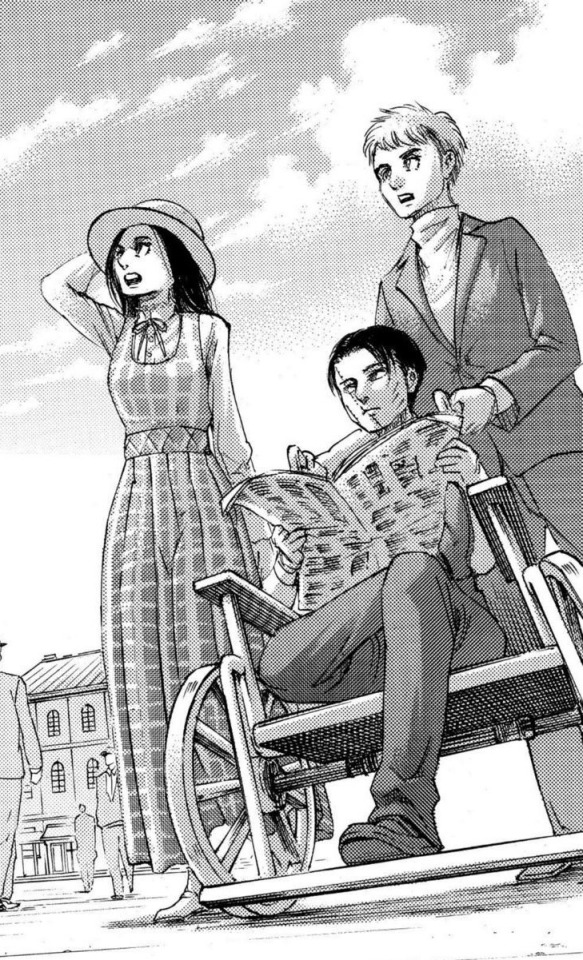
It was not indicated what he'd been doing post-Rumbling. The end of Titans' curse also put an end to the Ackerman bloodline's "awakened power" and above-average human strength, so he's probably a military consultant or mentor, given his amazing contribution as humanity's strongest warrior.
It was also shown he remained in the capital and is with now-grown Falco and Gabi, who both have shown their potential for a military career.
Meanwhile, unlike Levi, Mikasa chose to retire and live in her hometown. While others remark her ending as tragic (I'm guilty of this tbh), her former comrades were on their way to see her and visit Eren's grave next to the tree from their childhood, making her not entirely lonely. I wished she and Armin were in the same multiple frames of the latter panels of the final chapter as they both grieve losing Eren. But given Armin's new and bigger responsibilities for humanity, it's impossible.
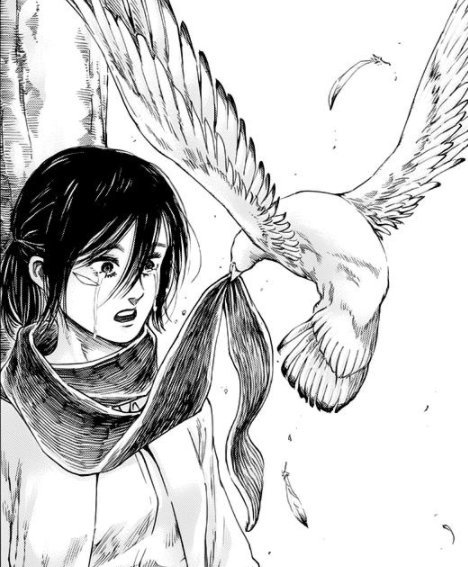
EreMika may not be endgame, and I may be bound to perpetual frustration of them never getting the chance to wear their hearts on their sleeves, I am satisfied with the ending—imperfect but fitting. It's actually funny that my feelings got the best of me upon reading the last chapter, and cursed at the story for not ending in absolute peace and bliss, forgetting that AoT had always been a poignant, anxiety-induced, existentialist story, and hinted at a bittersweet finale from the start.
#Hajime Isayama#Attack on Titan#Shingeki No Kyojin#AoT 139#attack on titan#snk#SnK 139#AoT ending#SnK ending#Eren#Armin#Mikasa#Eren Jeager#Eren Yeager#Armin Arlert#Mikasa Ackerman#Levi Ackerman#Levi
110 notes
·
View notes
Text
Greta Gerwig: 'I'm at peak shock and happiness'
by Tim Lewis, Sun 4 Feb 2018.
source: https://www.theguardian.com/film/2018/feb/04/greta-gerwig-lady-bird-interview-metoo-oscars
This year’s Oscar nominations were announced a couple of Tuesdays ago in Los Angeles at the frankly antisocial hour of 5.22am. Greta Gerwig, whose very personal, coming-of-age debut film Lady Bird was hotly tipped, lives in New York but happened to be in LA for work. She woke up first at 3.30am: “And I said, ‘No, it’s not time’ and I forced myself to go back to sleep.” When she eventually surfaced just before seven, the nominations were headlines around the world. Gerwig made herself a coffee, had a shower and ever-so-casually checked her phone. There it was: she’d made the cut for best original screenplay. And “achievement in directing”. Oh, and Lady Bird was in the running for best picture, too.
“I started crying and laughing and screaming,” says the 34-year-old Gerwig, who, until now, has been mainly known as an actor, often in comic roles. “And it sunk in… It’s still sinking in. It doesn’t quite feel real. You’re still getting me at peak shock and happiness.”
The Oscar selections were a personal triumph for Gerwig and for Lady Bird – its stars, Saoirse Ronan and Laurie Metcalf, who play a squabbling daughter and mother, are also nominated – but it was an important moment for female film-makers everywhere. Gerwig, scarcely credibly, is only the fifth woman ever to be shortlisted in the best director category at the Academy Awards in its 90 years. If she wins on 4 March, she will only be the second, after Kathryn Bigelow for The Hurt Locker in 2010, to take the honour.
“I remember very well when Sofia Coppola was nominated for best director and won best screenplay [for Lost in Translation in 2004] and what that meant to me,” says Gerwig on the phone from New York last week. “And I remember when Kathryn Bigelow won for best director and how it seemed as if possibilities were expanded because of it. I genuinely hope that what this means to women of all ages – young women, women who are well into their careers – is that they look at this and they think, ‘I want to go make my movie.’ Because a diversity of storytellers is incredibly important and also I want to see their movies. I want to know what they have to say! So I hope that’s what it does.”
These have been a seismic few months for women in the film industry. The allegations against the producer Harvey Weinstein and others, while monstrous in their scope and detail, have led to the most positive kind of backlash: through the #MeToo and Time’s Up movements, and the 50/50 by 2020 initiative, which aims to have male-female parity in the business world in two years. There’s an optimism that Hollywood has changed for ever.
“I think it’s going to shift much more quickly now,” says Gerwig. “When studios are looking to hire now, they’ll ask themselves – as they rightly should – ‘Is there a woman who is qualified for this job?’ That’s tremendously important. And again, if I were running a studio, I would think that it’s just good business. Because I look at the audience response to films made by women about women that have done incredibly well and I’d say, ‘Well, that’s a reason right off the bat.’”
As for whether there are any plans for a co-ordinated style protest at this year’s Oscars, in line with the black gowns at the Golden Globes or white roses at the Grammys, both orchestrated by the Time’s Up organisers, Gerwig is unsure. “I am not aware of a dress code,” she says. But if there is, she’s in: “I’m in awe of the people who are collectively working on this.”
Gerwig insists she hasn’t dared yet think about how it would feel to win an Oscar. But if the Golden Globes, where Lady Bird took the prize for best film (comedy/musical), is anything to go by, she might well struggle to hold it together. “I had an entire speech prepared but once I got up there, none of it came out,” she says with a laugh. “I was looking down and I saw Oprah and Steven Spielberg and I just went into a state of sublime happiness. I think I just said ‘thank you’ a lot. So my guess would be, I’ll prepare and probably I’ll not say any of it – if it should happen. Because that’s just how those moments seem to go for me.”
When I first talk to Gerwig, on an otherwise regulation Friday during the London film festival, there is a surreal, even comic, imbalance in London’s Soho hotel. Movie stars, it appears, outnumber the rest of us. Bill Nighy stands at a urinal in the men’s room, director Alexander Payne sweeps through the lobby. In the lift up to the suite where Gerwig is doing interviews, who else? The great Christoph Waltz.
“Christoph Waltz is here?” she shrieks. The pair became friends when they were on the jury for the Berlin film festival and catch up every so often for dinner in New York. “He’s one of my favourite people; he makes fun of me the entire time,” says Gerwig. “On the jury, there was this one time where we had a meeting with Angela Merkel. So I wore something that felt appropriate for a daytime lunch with a head of state. And I showed up and Christoph looked at me and said – she slips into a strident Mitteleuropean accent – ‘Greta, are you applying for an internship with Angela?’” Gerwig cracks up. “‘Did you bring your resumé?’ I looked such a nerd.”
Payne she knows less well, but is an ardent fan. At the Telluride festival last September, there was a photocall for the film-makers in attendance and Gerwig collected a giant bruise on her leg trying to hurdle a bench to tell Payne how much she liked his latest movie, Downsizing. “I thought, ‘I must tell him it’s a masterpiece,’” she explains. “So as I’m jumping over the bench, it clipped my shin and I went sprawling. Everyone turned to look and I looked up at him and I said, ‘It was a masterpiece!’ And he said, ‘You could have just walked over.’”
Right now, there are plenty of people – rightly and properly, albeit metaphorically – tripping over furniture to tell Gerwig that she’s made her own masterpiece. Lady Bird is a beautiful, affectionate rumination on the mother-daughter dynamic that could well be this year’s Moonlight: an underdog that charms and surprises, and overshadows everything else.
It is not immediately clear how to square these achievements with Gerwig’s tendency towards self-deprecation. Physically, she mixes elegance with eccentricity. At 5ft 9in, with credulous sea-green eyes, and today wearing a pink, pleated cocktail dress with buckled black-and-white heels, she presents an image of impossible glamour. But she undercuts the effect by slouching a little, laughing unguardedly and demonstrating odd and endearing mannerisms, such as the stiff handshake of a Victorian industrialist packing his son off to boarding school.
“I arrived on a flight this morning at 6am, so this is all pretend,” she explains, smoothing an invisible wrinkle on her frock. “I don’t actually feel like this inside. People came to my room and made me look nice. I know, everyone needs it.”
In Lady Bird and before, Gerwig is drawn to dreamers: young women who believe they are destined for greatness, even when the audience finds plenty of cause to doubt that. The film follows Ronan as 17-year-old Christine McPherson, who’d rather you call her Lady Bird: when asked if it’s her given name, she clarifies: “It’s given to me, by me.” The year is 2002, the place is Sacramento, a mid-size city in California, and both these facts are a cruel disappointment to her: “The only exciting thing about 2002 is that it’s a palindrome,” Lady Bird sighs. She’s in her final year at an all-girls Catholic high school and, after graduating, she wants to move to the east coast to study, “where writers live in the woods”. This is one of many, though perhaps the most irreconcilable, point of contention with her mother, Marion (a heart-wrenching Metcalf).
It has been a common assumption that Lady Bird is Gerwig’s teenage diaries transcribed. She, too, grew up in Sacramento and attended a Catholic school there, before escaping to the other side of the country, to Barnard College in New York, where she studied English and wanted to become a playwright. But, Gerwig notes, not sniffily, that there are plenty of differences, as well. She didn’t dye her hair pink or assume a strange name or even argue that viciously with her mother.
“Even though it isn’t literally autobiographical there’s a core of emotional truth that’s very resonant,” says Gerwig. “Again, it’s not what literally happened, but it does rhyme with the truth. It’s close in a way. And it doesn’t bother me, because it’s the assumption people make and in a way maybe they make that assumption because it feels very real. So it’s not dissimilar to when people think a character is you. Which you could be offended by or you could also think, ‘Well, then I’ve done my job. You’ve believed it. You think that’s me.’
“But I don’t know,” she continues. “I think one thing about doing this for a period of time is that you learn how to live through either misconceptions or correct conceptions and just continue doing the work. Because then you figure, ‘Well, in the end, I’ll just be an old lady one day and then they’ll think, Oh, she’s an old lady.’ And they’ll be right!”
What, then, are some solid, hard facts about Gerwig? She is the eldest child of Gordon and Christine, a loans officer for a credit union and a retired nurse respectively. As a child, she was a diligent student with an obsessive streak: her first passion was dancing; later, she would become skilled in the sport of fencing.
“I loved ballet,” says Gerwig. “I always knew I wasn’t the most naturally gifted of anyone who was doing ballet. I didn’t have quite enough turn out, my feet weren’t quite right, but I did work harder than anyone else. And I think that’s something I have maintained. There’s no substitute for hard work.”
Gerwig acted a little at school but became more serious at college. She saw herself as a theatre person, but when she was rejected from graduate programmes in playwriting, she started working on films with her friends. These no-budget projects became notorious in arty, hipster circles and then beyond, where they were, somewhat derisively, called mumblecore; they were sketched out, but not scripted, and the makers were involved in every aspect of production.
“Those became kind of a makeshift film school for me,” says Gerwig, referring to LOL (2006), Hannah Takes the Stairs (2007) and Nights and Weekends (2008), which she made with Joe Swanberg. “When I went into pre-production for Lady Bird, I’d been working in films in different capacities for 10 years. Especially on the early little ones because it was an all-hands-on-deck situation. If you weren’t doing something on camera, you held the camera.”
These early films, too, led in a roundabout way to Gerwig’s acting breakthrough. Swanberg knew the director Noah Baumbach and he then cast her in his 2010 film Greenberg, opposite Ben Stiller. The film received mixed notices, but Gerwig’s performance caught many eyes. In the New York Times, critic AO Scott described her style as a method without method. “Ms Gerwig,” he wrote, “most likely without intending to be anything of the kind, may well be the definitive screen actress of her generation, a judgment I offer with all sincerity and a measure of ambivalence.”
Greenberg was a life-changing experience personally as well: after it wrapped, Gerwig and Baumbach began dating, for a while on the down-low, these days more openly, though Gerwig tends to refer to him as “Noah Baumbach” or “Baumbach” in our interview, suggesting they keep their work and private lives quite distinct. They soon began collaborating and their first film as a writing team was 2012’s Frances Ha, a warm-hearted, black-and-white comedy about a dancer, Frances (Gerwig), who doesn’t seem wholly cut out for the real world. They followed that with Mistress America in 2015, which has a similar vibe: Gerwig plays Brooke, who has a million creative ideas and a very low strike rate.
Gerwig’s writing, first with Baumbach and now on her own, has a naturalistic tone that is funny without having jokes, heartbreaking without being schmaltzy, highly specific and yet clearly universal. She is so particular about how the dialogue sounds – the “music” of speech – that there is a not a single line of improvisation in Lady Bird, not even an added “like” or “you know”.
“I like language that sounds quotidian but poetic,” says Gerwig – the perfect description. “Something that maybe the character doesn’t even know is as beautiful as it is. That’s something I was working through when I was writing with Noah Baumbach and I just kept moving in that direction. That was always what I liked. That quality of stumbling into beauty and then it’s gone.”
It is a timely moment for Gerwig to emerge as a director and for her debut to have such an assured, idiosyncratic voice. Despite the success of Lady Bird at the Golden Globes in January, Gerwig was a glaring absentee on the best director shortlist. Natalie Portman, presenting the award, made the point succinctly, announcing: “And here are the all-male nominees.” Likewise, the Baftas have a five-man shortlist.
Of course, this is just one facet of the soul searching that the film industry is now going through. In the week that I meet Gerwig, the first allegations of sexual abuse have been made against Harvey Weinstein, and it was clear that Gerwig found the revelations upsetting and deeply shocking.
“I felt so badly for all those women,” she says, “and I felt so understanding of where they were, especially the young women, the women who were in college, the women who were just excited about movies and film-making and found themselves in a position that they didn’t know how to say no, but they didn’t know how to leave and that they felt overpowered and then they felt scared to say anything.”
There are tears in her eyes; her voice cracks. “I’ve felt for so long that there just need to be more women in positions of power,” Gerwig goes on. “Not that women are magic or perfect beings, but that they need to have a seat at the table because then I would think that things like this would have far less chance of happening.”
When Gerwig realised she was writing about mothers and daughters, she started thinking about movies that covered a similar theme. There were hundreds of films on the father-son relationship, including some excellent ones by Baumbach, but she struggled to think of stories told from the female perspective: James Brooks’s Terms of Endearment (1983) and Mike Leigh’s Secrets and Lies (1996) were among the rare inspirations. “There are surprisingly few movies about it,” says Gerwig, “and I think that speaks to the fact that there are surprisingly few female film-makers.”
In preparation for shooting Lady Bird, Gerwig created dossiers for her lead characters. Timothée Chalamet, for example – who plays Lady Bird’s crush Kyle and is also Oscar-nominated this year for his role in another coming-of- age drama, Call Me By Your Name – was directed towards the films of Éric Rohmer and a collection of theoretical essays, The Internet Does Not Exist. Kyle is a pretentious mansplainer: he lectures Lady Bird on how mobile phones are tracking devices for the government and that clove cigarettes have fibreglass in them. At one point, he puts down Howard Zinn’s A People’s History of the United States to announce, “I’m trying to live by bartering alone”.
Kyle’s a pseud, but Gerwig clearly has a soft spot for him. “I am not a fan of phones,” she explains. “I talked for a long time with Timothée about his character’s beliefs, and he said, ‘The funny thing is that everybody is going to think you’re Lady Bird, but you’re Kyle’.” Gerwig laughs, “And I was like, ‘I know! I am secretly Kyle.’ I have all of the same paranoias as Kyle does.”
Gerwig is technically a millennial, but not spiritually so. She grew up pre-internet and has no social media presence: “Sure, I’ll lurk. But I don’t participate. I’m just a Peeping Tom.” Part of the reason for setting Lady Bird in 2002 is that it’s not “cinematic” to shoot screens. She longs for the pre-phone era when you couldn’t get hold of someone instantly, and the only way to find them would be to drive around to all the locations they might be. We rarely allow ourselves to become properly bored, Gerwig believes, and the internet and smartphones are in part responsible.
On the wall of her bedroom, Lady Bird has the Leo Tolstoy quote, “Boredom: the desire for desires.” “Boredom is, I think, pretty useful,” says Gerwig. “You need to reach a level of boredom to make anything. Because I don’t know if you remember, being bored as a kid, just so bored. You were at a grocery store with your mom and you were like, ‘It’s just excruciating!’ But then you get to a point where you start making up a game for yourself or you’ll start imagining things or whatever it is. But I worry that we’ve lost that capacity, which I think maybe erodes some creativity as well.
“I’m just as bad as anyone,” she admits. “Because it’s like your flitting brain can be completely satisfied by this machine that can give you feedback for all of your passing thoughts. Like, ‘Where can you grow avocados?’ I don’t know, let’s find out. And then, ‘Oh, how much water does an avocado tree take every year?’ Let’s look at that. And then, ‘Different crops and the water usage for each of them.’ You are creating this weird feedback loop for yourself.”
This is a very Gerwigian conundrum: hem-hawing about restricting access to the internet because she’s worried she’ll waste time Googling avocados. But she’s not saying it to be cute. It clearly concerns her. One of the strict directives on the set of the Lady Bird was that it was entirely phone-free. “And not just for the actors, for the crew,” she says, “because it’s quite depressing for an actor to be doing an emotional scene and look over and see someone checking Instagram. It’s a real bummer. But it was quite impressive, because I had a lot of young people in this movie and none of them ever brought their phones to set. Saoirse set the tone: I never saw her on her phone, never once.”
Gerwig is effusive about her two stars, Ronan and Metcalf. Everything in the film, she says, comes back to “the central love story” between Marion and Christine, mother and daughter. “For all of time it’s probably been the most rich, fraught relationship. Something with Laurie and Saoirse that I loved was that they were the same height and I gave them the same haircuts so that when they were in profile, you say: ‘Oh, you’re so at odds with each other but actually you’re the same. And that’s why the fighting is so intense because you guys can both bring it.’
“So I knew I needed actresses who could punch the same weight class,” Gerwig adds. “They give extraordinary performances and they should get all the statues and prizes. Work like that should be rewarded.”
For her part, whatever happens, Gerwig insists that little will change. She will keep acting – when the project and specifically the director is right – and she wants to collaborate with Baumbach again: “I hope Noah and I will write another movie together because it’s really, really fun.” She also wants to start her own production company one day. “It’s important that if you have any kind of a platform and it matters to you that you should figure out how to bring other people along,” she says.
As for the Oscars, she is not about to pretend that she’s not freaking out a little. “I grew up watching all the award shows and I’d put on a fancy dress and watch it with my friends,” Gerwig recalls. “It’s thrilling and it’s also part of what the dream of making films is.”
Then Gerwig’s eyes narrow; these are defining moments both for her personally as a director and also as an inspirational member of the too-small band of female film-makers. “But awards are not important in terms of whether or not I’ll make another film,” she says. “I’ll keep making films, no matter what.”
0 notes